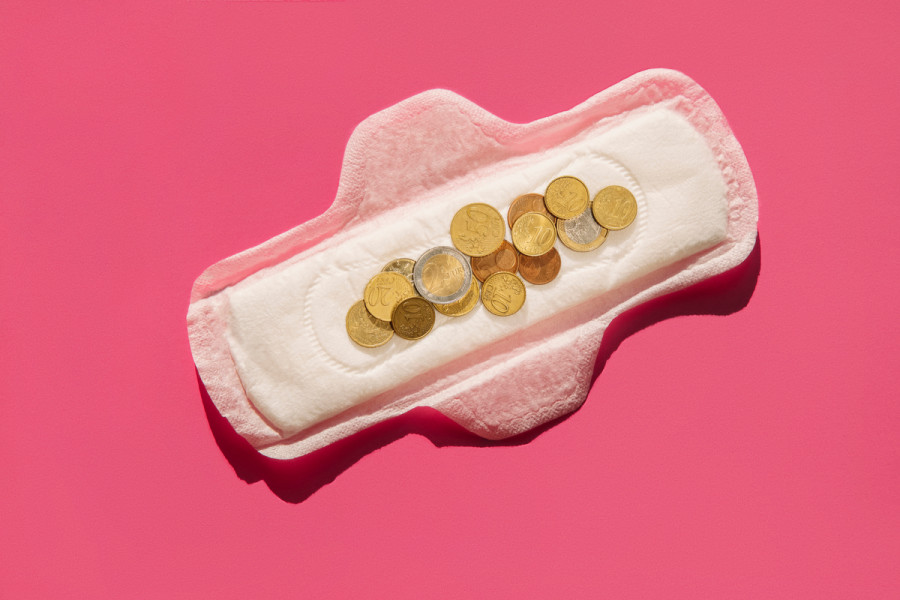Columns
Remove the ‘luxury tax’ to overcome period poverty in Nepal
Nepal should stop charging value added tax on menstrual products to make them more affordable.
Jesselina Rana & Shubhangi Rana
It is common knowledge that Nepali society is replete with menstrual myths and misconceptions. From a very young age, menstruating individuals are made to believe that their menstrual cycle makes them impure, and it can only be talked about behind closed doors. In many households, family members refer to menstruating individuals as nachhune or parasareko during their menstrual cycle, terms they also use to refer to themselves; which directly translates as a state of being untouchable.
It is estimated that around 83 percent of menstruating individuals face some form of restriction or exclusion during their menstrual cycle in Nepal. This ranges from being barred from partaking in daily activities and entering the kitchen or places of worship to facing extreme taboos like being kept outside in cowsheds (chhaupadi pratha). Even after the Supreme Court declared chhaupadi pratha illegal in 2005 and the Criminal Code (Act) criminalised it in 2017, many communities, especially in the Far West, continue to rigidly follow this inhumane and discriminatory practice.
Cultural shame
The cultural shame associated with menstruation prevents people from talking about it which, in turn, averts dialogue about access to products, proper health and sanitation, and the period tax. The stigmatisation of menstrual health has also left an entire community of menstruators out of this pertinent conversation. Transgender men and non-binary individuals continue to be conveniently forgotten in efforts aimed at destigmatising and increasing access to menstrual products, whether by various organisations or the government of Nepal.
While taboos play a pertinent role in moulding menstruating individuals’ menstrual experience, lack of affordable access to menstrual products too can adversely impact our experience, health and dignity during the menstrual cycle. Nepal continues to be one of many countries that impose a 13 percent value added tax (VAT) on menstrual products. This 13 percent VAT increases the cost of menstrual products significantly—hindering affordable access and treating these essential goods as luxury items. Nepal has granted VAT exemption to what the government considers ‘essential’ items such as medicines, medical supplies and various forms of contraceptives such as condoms. The VAT Act as per Schedule 1 allows essential items such as condoms and other contraceptives not to be taxed to ensure widespread affordability and access.
While it can be argued that effective family planning and safe sex practices are important focal issues within the context of Nepal, the same can also be said for healthcare and hygiene, especially that of menstruating individuals. The constitution affirms, as a fundamental right under Article 38(2), the Rights of Women and includes the right to safe motherhood and reproductive health as part of this right. Yet, menstrual products are not even close to being considered as essential enough for VAT to be exempted. Lack of safe and affordable menstrual products forces menstruators across the country to adopt poor menstrual hygiene practices. This can cause physical health risks, and lead to reproductive and urinary tract infections, and even more severe diseases like cervical cancer.
The government’s inability to acknowledge menstrual products as essential items signals a much larger issue of period poverty within the Nepali context, which was exposed during the current global pandemic and the lockdown that followed. During the Covid-19 lockdown, menstrual products were not included in the list of essential items despite repeated advocacy and appeal efforts by civil society. This hampered the supply chain, as pad manufacturers and retailers were not able to function at full capacity. Menstruators bore the brunt of this lapse as they could not access menstrual products as readily as before. Further, lack of employment and income during the nationwide lockdown made menstrual products even more of a luxury item for many, affordable and accessible to only a niche crowd.
Social problem
Period poverty was, and continues to be, a serious social problem in Nepal. Period poverty in particular prevents low-income menstruators from bleeding with dignity as they are forced to use unhygienic means during their period such as rags, used banners, old pieces of clothes, and even leaves. The cracks in the current system have been more glaringly exposed during the global pandemic. In order to combat the challenges posed by affordable access to menstrual products, many countries, including India and the Maldives, have removed VAT from period products. It is time for Nepal to follow suit and become the third country in South Asia to have no VAT on menstrual products.
We have been striving to ensure affordable access to menstrual products, and spread awareness and advocacy about menstrual health and services, as well as proper sanitation and hygiene, to promote holistic growth of menstruating individuals. It is time we all actively sought to pressure those concerned to remove VAT from all menstrual products in Nepal. Join the movement. Together, we can be the revolution we want.




 16.33°C Kathmandu
16.33°C Kathmandu
















